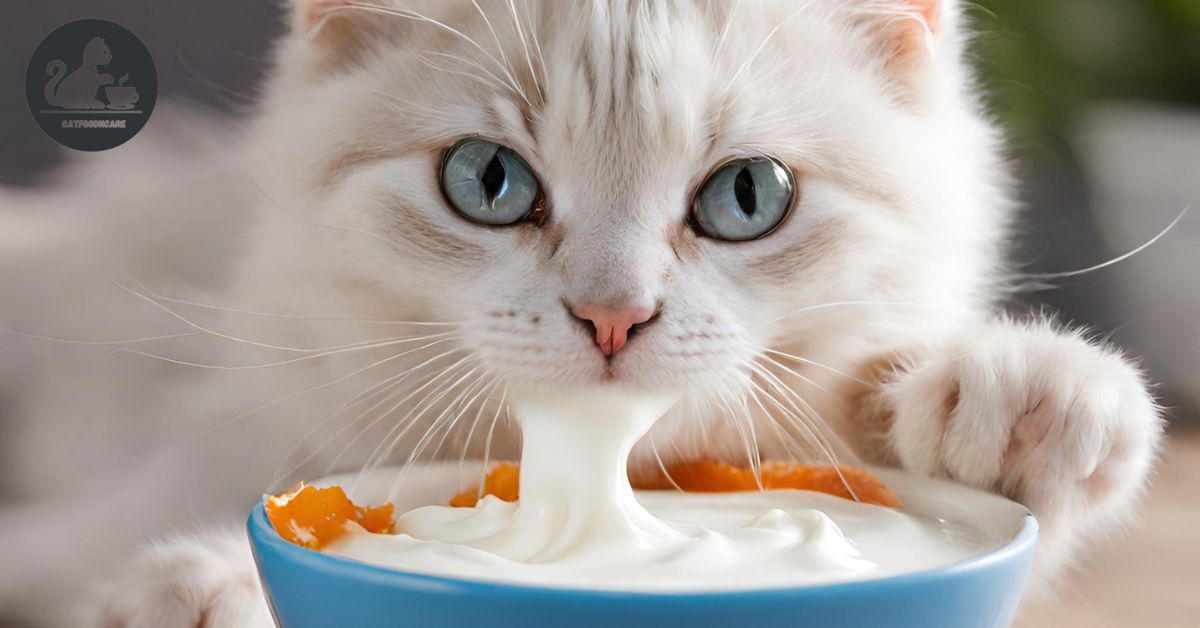Cats are known for their curious nature and their love for trying out different foods. But when it comes to feeding your feline friend, it’s important to know what’s safe and what’s not. One question that often pops up among cat owners is, Can cats eat yogurt? The answer is yes, but with some caveats.
Yogurt, a popular dairy product, can be a tasty treat for your cat. However, not all types of yogurt are safe for cats. Plain, unsweetened yogurt is the best choice for your furry friend. Flavored yogurts, especially those with artificial sweeteners, can contain toxic ingredients that may harm your cat.
While yogurt can provide some health benefits like friendly bacteria for your cat’s digestive system, it’s not a substitute for a balanced diet. Adult cats can have digestive issues with dairy products, so yogurt should be given as an occasional treat, not a regular part of their diet. Overconsumption can lead to an upset stomach or symptoms of lactose intolerance.
while yogurt is not toxic to cats, it’s essential to choose the right type of yogurt and serve it in moderation. Always consult with a veterinary professional if you’re unsure about introducing new foods to your cat’s diet.
What Do Veterinarians Say about Feeding Yogurt to Cats?
Veterinarians generally agree that yogurt can be a safe treat for your feline friend if given in moderation. However, not all types of yogurt are suitable for cats. Plain yogurt or Greek yogurt are the best options, as they are high in protein and contain friendly bacteria that can aid in digestion.

However, many flavored yogurts contain artificial sweeteners and extra ingredients that can be harmful to cats. For instance, xylitol, a common sugar substitute, is toxic to cats. Also, some cats may be lactose intolerant and can experience digestive issues like an upset stomach after consuming dairy products.
While yogurt has some health benefits, it should not replace a balanced diet of commercial cat food which is specially formulated to provide all the essential nutrients your cat needs.
If you decide to give your cat yogurt, start with a small spoonful of yogurt and watch for any adverse reactions. If your cat enjoys the taste and doesn’t show any signs of discomfort, it can be an occasional treat.
Remember, while yogurt can be a tasty treat and a source of probiotics, it’s not a necessary part of a cat’s diet. Always consult with a veterinary professional before introducing new foods into your cat’s diet.
Can Cats Eat Yogurt?
Yes, cats can eat yogurt. However, it’s important to note that not all yogurts are safe for your feline friend. Always choose plain, unsweetened yogurt over flavored yogurts, as these often contain artificial sweeteners and other harmful ingredients that can cause upset stomach and other digestive issues in cats.
Yogurt is a dairy product, and while it’s a common belief that cats love all dairy, many adult cats are actually lactose intolerant. This means that consuming dairy can lead to symptoms of lactose intolerance, such as stomach upset and diarrhea.
However, yogurt is different from other dairy products like a saucer of milk or a bowl of milk. The fermentation process yogurt undergoes reduces its lactose content, making it easier for cats to digest. Plus, yogurt contains friendly bacteria, or probiotics, that can aid in digestion and promote digestive health.
Yogurt also offers some nutritional benefits. For example, Greek yogurt contains about 10 grams of protein per 100 grams, making it a good source of animal protein.
But remember, even though cats can eat yogurt, it should only be given as an occasional treat and not a regular part of their diet. Cats require a balanced diet of cat foods that are specially formulated to meet their nutritional needs. Too much human food, even something as seemingly harmless as yogurt, can lead to health issues.
While yogurt can be a safe treat for cats, it’s best to consult with a veterinary professional before introducing any new foods into your cat’s diet.
Nutritional Benefits of Yogurt for Cats?
- Yogurt can be a tasty treat for your feline friend, but it’s important to know the nutritional benefits and potential risks. Here are some key points:
- Yogurt is a dairy product that contains friendly bacteria which can aid in digestion. This can be beneficial for cats with digestive issues.
- Greek yogurt and plain, low-fat yogurt are the best types of yogurt for cats. They are high in protein and have less sugar than flavored yogurts.
- Yogurt is a good source of essential nutrients like calcium and vitamins B2, which are important for your cat’s health.
- It can be an occasional treat for adult cats, but it should not replace a balanced diet of cat foods.
Avoid giving your cat yogurt with extra ingredients like artificial sweeteners, which can upset their stomach. Stick to plain, unsweetened yogurt. - Not all cats can tolerate dairy. Watch for symptoms of lactose intolerance such as upset stomach or loss of appetite.
- Always consult with a veterinary professional before introducing new foods to your cat’s diet.
Remember, while yogurt has health benefits, it should be given in moderation as part of a balanced diet.
Potential Health Risks of Feeding Yogurt to Cats?
Feeding your feline friend yogurt can pose several health risks. Here are some potential dangers:
- Digestive Issues: Adult cats often have trouble digesting dairy products, including yogurt. This can lead to an upset stomach or symptoms of lactose intolerance such as diarrhea or vomiting.
- Toxic Ingredients: Some types of yogurt, particularly flavored yogurts, contain artificial sweeteners or other harmful ingredients that can be toxic to cats.
- Extra Calories: Yogurt, especially flavored or sweetened varieties, can add extra calories to your cat’s diet, potentially leading to weight gain or obesity.
- Allergic Reactions: Some cats may have an allergic reaction to yogurt or its ingredients, causing symptoms like itching, swelling, or difficulty breathing.
- Nutritional Imbalance: While yogurt does have some health benefits, it should not replace a balanced diet of cat foods designed to provide all the essential nutrients your cat needs.
Remember, always consult with a veterinary professional before introducing new foods into your cat’s diet. If your cat shows any signs of discomfort or adverse reactions after eating yogurt, seek immediate veterinary care.
How to Feed Yogurt to Cats Safely?
Feeding your feline friend yogurt can be a safe and tasty treat, but it’s important to do it correctly. Here’s a step-by-step guide on how to feed yogurt to cats safely.
1. Choose the Right Type of Yogurt: Not all yogurts are safe for cats. Avoid flavored yogurts as they often contain artificial sweeteners and extra ingredients that can cause digestive issues. Instead, opt for plain, unsweetened yogurt. Greek yogurt is a good choice as it has more grams of protein and fewer carbohydrates than regular yogurt.
2. Check for Toxic Ingredients: Some yogurts contain artificial ingredients and sugar substitutes that can be harmful to cats. Xylitol, a common sugar substitute, is particularly dangerous. Always read the label before giving your cat any human food.
3. Start with Small Amounts: Cats can have symptoms of lactose intolerance if they consume too much dairy. Start by giving your cat a small spoonful of yogurt and watch for any signs of an upset stomach or other adverse reactions.
4. Monitor Your Cat’s Reaction: If your cat shows signs of discomfort, such as abdominal pain or loss of appetite, stop feeding them yogurt and consult a veterinary professional.
5. Use Yogurt as an Occasional Treat: Yogurt should not replace your cat’s regular diet. It can be a great source of probiotics and can aid in digestion, but it should not be the main source of nutrition for your cat.
6. Consider the Caloric Content: Yogurt can be high in calories, so be mindful of your cat’s daily caloric intake. Too many extra calories can lead to weight gain and other health issues.
7. Avoid Feeding Kittens Yogurt: Kittens are often more sensitive to dairy products than adult cats. Until your kitten is older, stick to specially formulated kitten food.
8. Consult Your Vet: If you’re unsure about feeding your cat yogurt, it’s always best to consult with your vet. They can provide guidance based on your cat’s specific dietary needs and health conditions.
Remember, while yogurt can provide some health benefits for your cat, it’s not a necessary part of their diet. Always prioritize a balanced diet of high-quality cat food that is rich in animal protein and essential nutrients. Yogurt should be considered an occasional treat, not a staple food.
Conclusion
In wrapping up, it’s clear that cats can eat yogurt, but it should be given as an occasional treat and not a regular part of their diet. Plain, unsweetened yogurt is the best choice for your feline friend as it contains beneficial bacteria that can aid in digestion. However, some adult cats may have digestive issues or show symptoms of lactose intolerance after consuming this dairy product. Flavored yogurts often contain artificial sweeteners and other harmful ingredients that can upset your cat’s stomach. Always consult with a veterinary professional before introducing new foods into your cat’s diet.
Recent Posts
10 Best Canned Cat Foods of 2024, According to Veterinarians
Inside this expert-backed list of 2024's top wet cat foods, discover why veterinarians trust these brands for optimal feline nutrition.
Grab expert insights into the top-rated wet cat foods that veterinarians trust most, and discover why some brands outshine...

